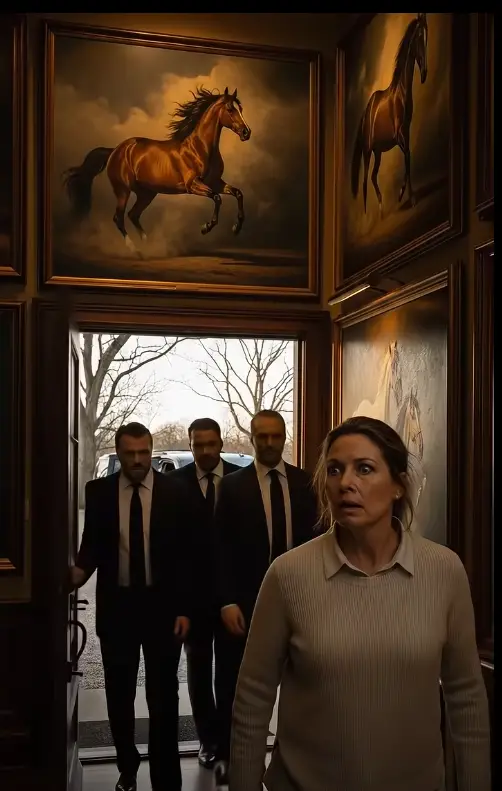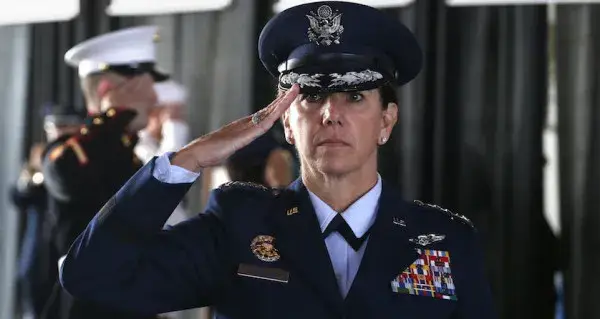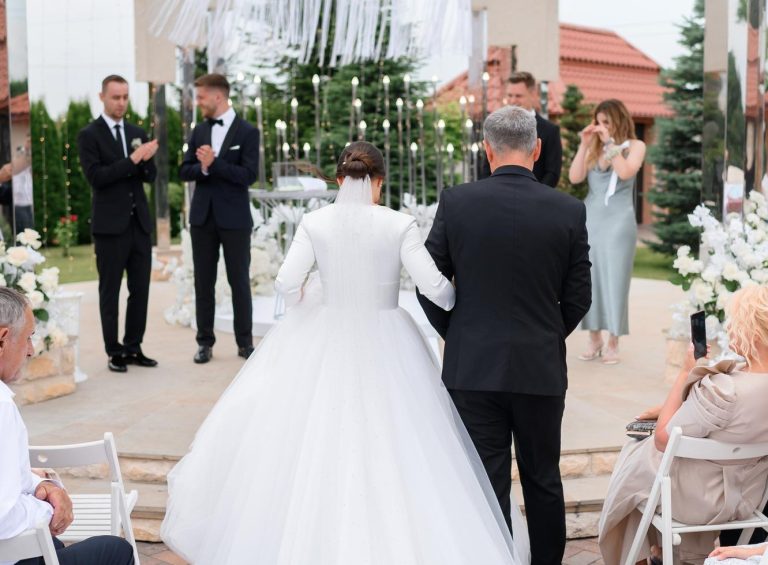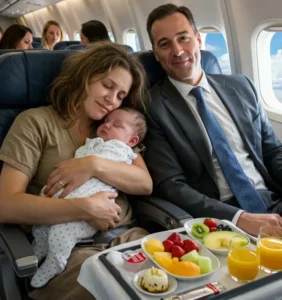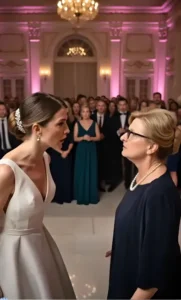Part One: The Promise
“Never go to the farm, Catherine. Promise me.”
Those words, spoken with an uncharacteristic intensity that had startled me awake in the depths of night, were one of the few absolute demands my husband, Joshua, ever made during our twenty-four years of marriage. His fingers had gripped my wrist—not painfully, but with an urgency that sent ice through my veins. His eyes, usually so calm and measured, had burned with something primal: fear, perhaps, or shame, or some volatile mixture of emotions I couldn’t begin to untangle.
For all those years, I had respected his wishes without question, even when a deep, gnawing curiosity ate at me during sleepless nights. The “farm” was a ghost, a shadowy place from a Canadian childhood he rarely mentioned, a property he had fled at eighteen and seemingly never looked back on. Whenever I gently probed—asking about his parents, his brothers, the sprawling Alberta landscape he must have known—Joshua would grow distant, his jaw tightening almost imperceptibly. The conversation would shift, always gracefully, always deliberately, until I learned to stop asking altogether.
But now, Joshua was gone. A sudden, violent heart attack had stolen him from me on a Tuesday morning in late September, collapsing in our kitchen with a coffee mug still clutched in his hand. At fifty-two, I was a widow with a grieving, bitter daughter and a future that felt like an uncharted, starless sea. The grief was a physical thing, a weight that pressed against my chest with every breath, making even the simplest tasks—brushing my teeth, answering the phone, choosing what to wear—feel insurmountable.
“Mrs. Mitchell?” The voice of Mr. Winters, Joshua’s attorney, pulled me from the depths of my thoughts. We were in his wood-paneled office, two weeks after the funeral, the raw finality of death now reduced to a stack of paperwork and the scratch of a pen against thick, expensive paper. Outside, autumn rain streaked the windows, blurring the Boston skyline into watercolor smudges of gray and gold.
“There’s one more item,” he continued, his voice carrying the practiced gentleness of a man accustomed to delivering news to the bereaved.
He slid a small, lacquered box across the polished mahogany surface of his desk. The box itself was beautiful—dark cherry wood with an inlaid maple leaf design on its lid, the craftsmanship exquisite. Inside, nestled on a bed of black velvet like a precious jewel, lay an antique brass key attached to a simple maple leaf keychain. Beside it was a sealed envelope with my name written in Joshua’s precise, familiar handwriting—the same handwriting that had penned love notes tucked into my lunch bag, birthday cards that made me cry, and grocery lists that always ended with “I love you.”
“What is this?” I asked, my voice barely above a whisper. The heavy key felt cold and foreign in my palm, its weight somehow ominous.
“Your husband purchased a property in Alberta, Canada, three years ago,” Mr. Winters explained, adjusting his wire-rimmed glasses in a gesture I’d come to recognize as his tell when delivering uncomfortable information. “According to his very specific instructions, you were only to be informed of its existence after his passing. The deed has been transferred to your name. All taxes and maintenance fees are paid for the next five years.”
The words didn’t compute. My mind stumbled over them, trying to force them into some logical framework. A property in Canada? Joshua, who balanced our checkbook to the penny, who consulted me on every major purchase from cars to furniture, had bought property without telling me?
“It’s called Maple Creek Farm,” Mr. Winters continued, watching my face carefully. “Apparently, it was his childhood home, though the deed shows it changed hands several times before he repurchased it. The transaction was substantial—nearly two million dollars.”
My hands began to tremble. Two million dollars. Where had that money come from? We’d lived comfortably in our modest Victorian in Cambridge, but we were hardly wealthy. Joshua was a software engineer, successful but not extravagantly so. I taught art history at a local community college. We saved for vacations, worried about Jenna’s student loans, clipped coupons like everyone else.
“Mrs. Mitchell,” Mr. Winters said, his voice lowering conspiratorially, leaning forward as if someone might overhear us in his private office, “there’s something else you should know. The property has become quite valuable recently. Significant oil deposits were discovered in the region about eighteen months ago. Your husband declined multiple offers from energy companies—substantial offers. We’re talking tens of millions of dollars.”
The room tilted. I gripped the edge of the desk, my knuckles white. Tens of millions. My practical, methodical Joshua, who had never mentioned oil, a secret farm, or any large financial transactions, had been sitting on a fortune and said nothing. How had he afforded this? And why, for God’s sake, had he kept it from me?
With trembling fingers, I opened the envelope. The paper was thick, expensive—the kind Joshua always said was wasteful. I could smell his cologne on it, that subtle woodsy scent that still clung to his clothes in our closet, the clothes I couldn’t bear to donate yet.
My dearest Catherine,
If you’re reading this, then I’ve left you too soon, and for that, I’m profoundly sorry. There’s so much I should have told you but couldn’t bring myself to face. The coward’s way out, I know, but I hope you’ll understand—or at least forgive me in time.
The farm is yours now. I’ve spent the last three years transforming it from the broken, haunted place of my childhood into something beautiful, something worthy of you. Every weekend I told you I was consulting in Montreal or attending conferences in Toronto, I was actually there, rebuilding not just a property but the shattered pieces of my past.
I know I made you promise never to go there. I’m releasing you from that promise. In fact, I’m begging you to go, just once, before you decide what to do with it. On the main house’s desk is a laptop. The password is the date we met, followed by your maiden name. Everything you need to know—everything I was too afraid to tell you while I drew breath—is there.
I love you, Cat, more than you’ll ever know. More than I ever showed you. You deserved a husband who was brave enough to share all of himself, not just the carefully curated parts. I’m sorry I wasn’t that man in life. Perhaps I can be, at least a little, in death.
Forever yours, Joshua
I clutched the letter to my chest, the paper a fragile link to the man I suddenly felt I didn’t know at all. Tears streamed down my face, hot and angry and confused. How dare he. How dare he keep secrets of this magnitude, make unilateral decisions about our future, and then apologize from beyond the grave where I couldn’t yell at him, couldn’t demand answers, couldn’t hold him accountable.
“I need to see this place,” I said, my voice surprisingly firm despite the tears. “Right away.”
“Of course,” Mr. Winters nodded, his expression sympathetic. “But I should warn you about something else. Joshua’s brothers in Canada—he had three of them, did you know?”
I shook my head mutely. Three brothers. Joshua had never mentioned any siblings.
“They’ve already contested the will,” he continued. “They claim he was not mentally competent when he repurchased the family property. They’re alleging undue influence, diminished capacity, even suggesting he was manipulated by someone.” His eyes met mine significantly. “They’re preparing to argue that you somehow coerced him into this purchase.”
The absurdity of it would have made me laugh if I weren’t so exhausted. “That’s ridiculous. Joshua was the most rational, methodical person I’ve ever known. He planned everything down to the smallest detail.”
“Nevertheless,” Mr. Winters cautioned, his expression grave, “given the property’s newfound value—and we’re talking about potential wealth in the hundreds of millions once drilling begins—it’s going to get very complicated, very quickly. These brothers have retained aggressive counsel. I’d recommend you don’t travel to Canada alone, and certainly don’t confront them without legal representation.”
I tucked the key and the letter into my coat pocket, a strange, fierce determination settling over me like armor. Twenty-four years of being the accommodating wife, the one who compromised, who kept the peace, who swallowed her questions—all of that evaporated in an instant. “I’m going to Canada, Mr. Winters. Today. Or tomorrow at the latest.”
“Mrs. Mitchell—”
“Catherine,” I interrupted. “And I’m going. Joshua asked me to. That’s reason enough.”
Part Two: The Journey
Forty-eight hours later, after a hastily booked flight that cost a small fortune, and a long, solitary drive through the sprawling Alberta countryside in a rental car that smelled of pine air freshener and other people’s road trips, I stood before imposing wooden gates that rose at least twelve feet high. Wrought iron letters, elegant and slightly weathered, spelled out MAPLE CREEK FARM. Beyond them stretched a property far larger and more impressive than I had ever imagined.
Rolling hills, crowned with stands of maple trees ablaze in autumn gold and crimson, sloped down to a pristine, two-story farmhouse that looked like something from a luxury home magazine. This was no broken-down homestead. This was an estate. The kind of place celebrities bought for weekend retreats, the kind featured in architectural digests with captions like “rustic elegance meets modern luxury.”
The key turned smoothly in the lock of the gate, the mechanism well-oiled and clearly maintained. As I drove up the winding gravel driveway, my heart pounded with a mixture of anticipation and dread. What secrets had Joshua kept from me here? What part of himself had he hidden away for all these years? And more frighteningly—who had he been before I met him?
The farmhouse was stunning, a masterpiece of restoration that must have cost another fortune. Wide wraparound porch with hand-carved railings, large windows that caught the afternoon light, a roof of cedar shakes that looked both authentically aged and perfectly maintained. Flower beds, meticulously tended even now in late autumn, bordered the foundation. Someone had been caring for this place. Someone had been here recently.
My hands shook as I inserted the key into the front door. The lock clicked with a solid, satisfying sound, the door swung open on silent hinges, and I stepped across the threshold into my husband’s secret world.
I gasped, my knees weakening as I gripped the doorframe for support. The entryway opened into a soaring great room with exposed wooden beams that must have been original to the house—thick, hand-hewn timbers that spoke of craftsmanship from another era. A massive stone fireplace dominated one wall, its mantel adorned with framed photographs.
But it wasn’t the architecture that stole my breath, that made tears spring instantly to my eyes. It was the horses.
Not real ones, but everywhere I looked—dozens, perhaps hundreds of images. Exquisite oil paintings of horses in full gallop, their manes flying, muscles captured in perfect anatomical detail. Bronze sculptures on every surface, some small enough to hold in my hand, others life-sized, capturing their raw power and impossible grace. Framed photographs of magnificent breeds—Arabians with their distinctive profiles, powerful Clydesdales, elegant Thoroughbreds. My lifelong passion, the one indulgence Joshua had always supported but never quite shared, surrounded me in a private gallery dedicated to my greatest love.
I moved through the room in a daze, touching each piece. Many were originals by artists I recognized—Bonheur, Stubbs, even what looked like a genuine Remington bronze. The investment was staggering. But more than that, the knowledge required to curate such a collection, the understanding of what I would love—it spoke to hours of research, of careful attention to my tastes, my offhand comments about favorite painters and sculptors.
And there, on a heavy oak desk positioned by a window overlooking an endless pasture where I could see actual horses grazing in the distance, sat a sleek silver laptop with a single red rose laid across its closed lid. The rose was fresh, placed there recently. Someone had known I was coming.
Before I could take another step, before I could process any of this, the crunch of tires on gravel announced another arrival. Through the front window, I watched a black SUV pull up behind my rental car, the vehicle expensive and vaguely threatening. Three men emerged, all bearing the unmistakable Mitchell features: tall frames easily over six feet, dark hair though one was silver, and strong, unyielding jawlines. Even from a distance, even having never seen them before, I knew exactly who they were.
The Mitchell brothers had arrived. And from their grim, determined expressions, from the way they moved with proprietary confidence toward the house, they hadn’t come to welcome the widow to Canada.
Part Three: The Confrontation
I quickly closed and locked the front door, my heart hammering against my ribs so hard I thought it might bruise. I watched from a side window, partially hidden behind heavy curtains, as they conferred on the porch. Their movements were confident, proprietary, like men who owned this place and were merely tolerating an intruder. The oldest, a silver-haired version of Joshua with harder, colder eyes and a cruel set to his mouth, rapped sharply on the door with his knuckles.
“Mrs. Mitchell? Catherine? We know you’re in there. We saw your rental car at the airport. We should talk.” His voice carried the same Canadian accent that had softened Joshua’s speech only when he was tired or upset, but there was none of Joshua’s warmth in it. This voice was ice and iron.
I remained silent, backing away from the door, my breath coming in short gasps. Through the window, I could see the second brother—younger, heavier, with Joshua’s eyes but none of his kindness—pulling out his phone, clearly making a call. The third brother, closest to Joshua’s age, paced the porch like a caged predator.
“Catherine, this doesn’t have to be difficult,” the silver-haired one continued. “We’re family. Joshua would want us to settle this amicably. We have a very generous offer for you—one that would make you wealthy beyond anything you could have imagined. You could go back to Boston, never worry about money again. All we’re asking is that you hear us out.”
Every word was honey-laced poison. I could hear it in his tone, the way he said “family” like he was doing me a favor by acknowledging my existence. I glanced at the laptop. Whatever answers I needed were in there, not with the strangers on my porch who shared Joshua’s DNA but clearly none of his character.
Ignoring the increasingly aggressive knocking, I moved to the desk, opened the computer, and entered the password with trembling fingers: 05151998Mitchell. May 15, 1998—the day we’d met at a gallery opening where I was giving a lecture on equestrian art through history. Joshua had asked the most insightful question about Stubbs’ anatomical studies, and I’d fallen in love before dessert.
The screen came to life, opening immediately to a single folder labeled simply: For Catherine. Inside were hundreds of video files, each named with a date, starting from the day after his funeral and extending a full year into the future. Three hundred and sixty-five days of videos. One for every day of my first year without him.
With trembling fingers, tears already blurring my vision, I clicked on the first one.
Joshua’s face filled the screen. Not the thin, pale version from his final months, when he’d claimed he was just stressed about a project at work, but healthy, vibrant, his eyes crinkling with that crooked grin that had always made my heart skip a beat. His hair was slightly longer than he usually wore it, and there was a fullness to his face that I realized with a shock I hadn’t seen in person for months.
“Hello, Cat.” His voice, warm and alive, shattered something inside me. “If you’re watching this, then I’m gone, and you’ve come to the farm despite my years of making you promise not to.” He chuckled softly, the sound so familiar it hurt. “I should have known you wouldn’t be able to resist. Curiosity was always your most endearing and frustrating quality.”
A lump formed in my throat. Even now, even from beyond death, he knew me so well.
“I’ve made a video for every day of your first year without me,” he continued, his expression growing more serious. “One year of me keeping you company while you grieve. One year of explaining everything I should have told you while I was alive. One year of being the husband I should have been—honest, open, brave enough to face the past.”
He looked down briefly, his jaw working the way it always did when he was gathering courage. Then he looked back at the camera, his expression resolute. “Starting with why I bought back this farm I swore I’d never set foot on again.”
The knocking outside had stopped. Through the window, I could see the men returning to their vehicle, retrieving a leather portfolio of documents. They were regrouping, planning their next move.
“Three years ago,” Joshua continued, his voice steady but strained, “I collapsed at work. The company insisted I see their doctor. That’s when I was diagnosed with hypertrophic cardiomyopathy, a heart condition I inherited from my father—the same condition that killed him at fifty-five. The doctors gave me two to five years, probably closer to two given the severity.”
The world stopped. Time stopped. My mind simply couldn’t process what I was hearing.
“I chose not to tell you or Jenna,” he said, his eyes glistening with unshed tears. “I know, I know—you’re furious right now. You have every right to be. But please, let me explain. I didn’t want pity, Cat. I didn’t want our final years to be overshadowed by death, by appointments and treatments and the slow, terrible countdown. I didn’t want Jenna’s last memories of me to be of a dying man. I wanted to live fully with you until the end, not slowly die in front of you.”
My hands covered my mouth, stifling a sob. The weight loss. The tiredness he’d blamed on work. The way he’d started saying “I love you” at random moments, intensely, desperately. All of it made horrible, perfect sense now.
“I know you’re angry right now,” he said, as if reading my thoughts across the barrier of death. “You’re probably thinking about all the times you could have helped, all the decisions we should have made together. You’re right. But I hope you’ll understand that I made this choice out of love, not deception. Perhaps that’s a distinction without a difference. Perhaps I’m just making excuses for my cowardice.”
He leaned closer to the camera, and I could see the fine lines around his eyes, the gray threading through his hair that he’d stopped dyeing. “When I got my diagnosis, I went through the usual stages—denial, anger, bargaining. But then I reached a kind of clarity. I decided to use whatever time I had left to create something meaningful for you. You always loved horses, always dreamed of having land someday, maybe a small stable. You’d make comments when we drove through the countryside—’Wouldn’t it be lovely to wake up to that view?’ or ‘Imagine having space to breathe.’ So I decided to find that place for you.”
A crash from outside made me jump. Through the window, I saw one of the brothers had knocked over one of the planters on the porch in frustration. They were getting angrier.
“But I couldn’t just buy any farm,” Joshua continued. “I had to go back. I had to face the place I’d fled at eighteen. Maple Creek Farm, the broken place of my childhood, the source of every nightmare I’d had for thirty years. Because you see, Cat, I realized that I couldn’t give you a real gift, a true legacy, until I’d confronted my own demons. Until I’d transformed the place that had broken me into something that could heal you.”
He paused, taking a shaky breath. “What my brothers don’t know—what no one knows except the attorney—is that I legally bought this farm from our father five years before his death. The old man was broke, had drunk away everything our mother left us. He sold it to me for a fraction of its worth, making me swear to secrecy. He didn’t want his other sons to know how low he’d fallen. I’ve kept that secret, even as the farm changed hands twice more and I had to buy it back for far more than I’d originally paid.”
Outside, another vehicle was approaching—a police cruiser with its distinctive markings. The brothers watched its arrival with satisfied expressions, clearly having called in reinforcements.
“In the bottom drawer of this desk is a blue folder,” Joshua said, his voice urgent now, as if he’d anticipated this very moment. “Inside is every legal document you need—the original sale from my father, all subsequent transactions, geological surveys, property assessments, everything. The farm is unquestionably yours. I made sure of it. I had three different attorneys review the paperwork. My brothers will come for it now that there’s oil. They’ll try everything to take it from you—claims of incompetence, undue influence, forged signatures. Don’t believe them.”
He leaned even closer to the camera, his expression fierce. “But Cat, whether you keep this place or sell it is entirely your choice. I built it for you, transformed it for you, but I don’t want it to be a burden. If you want to sell it and never think about my past or my family again, do it with my blessing. The important thing is that you’re taken care of, that you and Jenna never have to worry.”
The video ended, freezing on his smiling face—a smile that was both brave and heartbroken—as an authoritative knock echoed through the house.
“Mrs. Mitchell, RCMP. We need you to open the door, please.”
With a deep breath that did nothing to steady my shaking hands, I retrieved the blue folder from the drawer. It was thick, professionally organized, with tabbed sections and a table of contents. Joshua, ever methodical, had prepared for battle. Now it was my war to fight.
Just as I reached for the door handle, my phone rang. Jenna, our daughter. Our twenty-six-year-old daughter who was probably at work, who was supposed to be moving on with her life, not dealing with her mother’s crisis.
“Mom?” Her voice was tight with an anger I recognized all too well—it was my voice, the one I used when I was trying desperately not to cry. “Why didn’t you tell me about Dad’s farm? Or the oil? His brothers just called me—from Canada, three men I’ve never heard of—offering me a settlement if I help them contest the will. They said you’re mentally unstable from grief, that Dad wouldn’t have wanted this. What the hell is going on?”
So they had gotten to her already. They’d anticipated my every move, even knew to manipulate my daughter. “Jenna, don’t sign anything,” I said, a fierce, protective instinct igniting within me. “These men are not our friends. They’re not family in any way that matters. Please, just trust me on this. I’ll explain everything, but not now. Not over the phone.”
“Mom, they said there’s millions of dollars—”
“There’s more than millions. And it’s ours. Your father made sure of it.” I hung up, knowing I was being unfair, knowing she deserved more, but unable to give it right now.
I opened the door to face a young RCMP constable who couldn’t have been more than thirty, flanked by the three Mitchell brothers, their faces ranging from smug to openly hostile. The silver-haired one—Robert, I learned later—looked at me with barely concealed contempt, like I was something unpleasant he’d found on his shoe.
“Mrs. Mitchell,” the constable began, his voice professionally neutral, “these gentlemen have a court order requesting an inspection of the property. They claim there are questions about the validity of the ownership transfer and the current state of valuable assets that may have been part of their family estate.”
I smiled calmly, channeling a strength I didn’t know I possessed, drawing on reserves of courage that must have been sleeping until this moment. “Of course, Constable. But first, I think you should see these.” I held out the blue folder with steady hands. “My husband anticipated this exact situation. In fact, I believe he anticipated these specific individuals making these specific claims.”
Robert, the eldest brother, scoffed, his face reddening. “Constable, my sister-in-law is understandably emotional and confused. She’s just lost her husband, she’s in a foreign country, she doesn’t understand Canadian law or property rights—”
“Actually,” I interrupted, my voice clear and steady and cold as the Alberta wind, “I’m neither emotional nor confused. I’m a widow standing on property that legally belongs to me, facing three strangers who happen to share my late husband’s DNA but who he never once mentioned in twenty-four years of marriage. That tells me everything I need to know about their relationship and their character. I’d appreciate it if you’d review these documents before allowing anyone onto my property, Constable.”
The constable took the folder, his expression neutral but his eyes sharp with interest. I watched the brothers exchange uneasy glances, their confidence visibly wavering for the first time. The middle brother—I later learned his name was David—actually took a step back, as if proximity to the folder might contaminate him.
I thought of Joshua’s video, of the secret he had kept to spare me pain, of the magnificent gift he had created in his final years while his heart slowly failed. Whatever game his brothers were playing, whatever cruel history they shared, I was determined to win. For Joshua. For Jenna. For the horses grazing in the pasture and the art on the walls and the love that had built this place from ruins.
The constable looked up after several minutes of reading, his expression changed, respectful now. “These appear to be in order, Mrs. Mitchell. A clear deed transfer from the original owner to Joshua Mitchell five years before the owner’s death, notarized statements from witnesses, bank records of the original purchase and all subsequent transactions, even geological surveys that predate the recent oil discovery by decades. Gentlemen, I don’t see any grounds for forcing an inspection today. If you wish to contest the will, that’s a matter for the courts, not for the police.”
As the brothers retreated to their SUV, their faces masks of thwarted greed and impotent rage, I felt a strange sense of both loss and discovery. The husband I thought I knew completely had kept secrets, some painful, others breathtakingly beautiful. He had lied to me, yes, but perhaps in the way that someone lies when the truth is too heavy to share, when the burden of knowledge feels like cruelty rather than honesty.
Now I faced a choice that would define the rest of my life: retreat to the safety of my familiar life in Boston, sell this place and take the money and run, or step fully into this unexpected legacy and all the battles that came with it.
I closed the door, walked back to the desk, and opened the laptop again. Tomorrow’s video awaited. The war for Maple Creek Farm had only just begun, but for the first time since Joshua’s death, I felt something other than grief. I felt purpose. I felt alive.
And somewhere, I liked to imagine, Joshua was watching and smiling that crooked smile, proud that his careful wife had found her inner warrior.
The screen flickered to life, showing Joshua’s face again, and I settled in to hear what he had to tell me about day two of my new life.

Emily Johnson is a critically acclaimed essayist and novelist known for her thought-provoking works centered on feminism, women’s rights, and modern relationships. Born and raised in Portland, Oregon, Emily grew up with a deep love of books, often spending her afternoons at her local library. She went on to study literature and gender studies at UCLA, where she became deeply involved in activism and began publishing essays in campus journals. Her debut essay collection, Voices Unbound, struck a chord with readers nationwide for its fearless exploration of gender dynamics, identity, and the challenges faced by women in contemporary society. Emily later transitioned into fiction, writing novels that balance compelling storytelling with social commentary. Her protagonists are often strong, multidimensional women navigating love, ambition, and the struggles of everyday life, making her a favorite among readers who crave authentic, relatable narratives. Critics praise her ability to merge personal intimacy with universal themes. Off the page, Emily is an advocate for women in publishing, leading workshops that encourage young female writers to embrace their voices. She lives in Seattle with her partner and two rescue cats, where she continues to write, teach, and inspire a new generation of storytellers.




